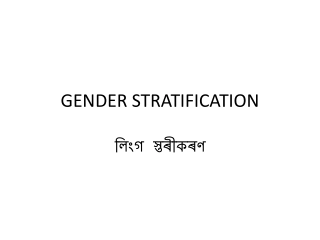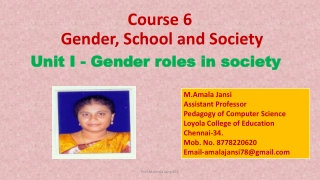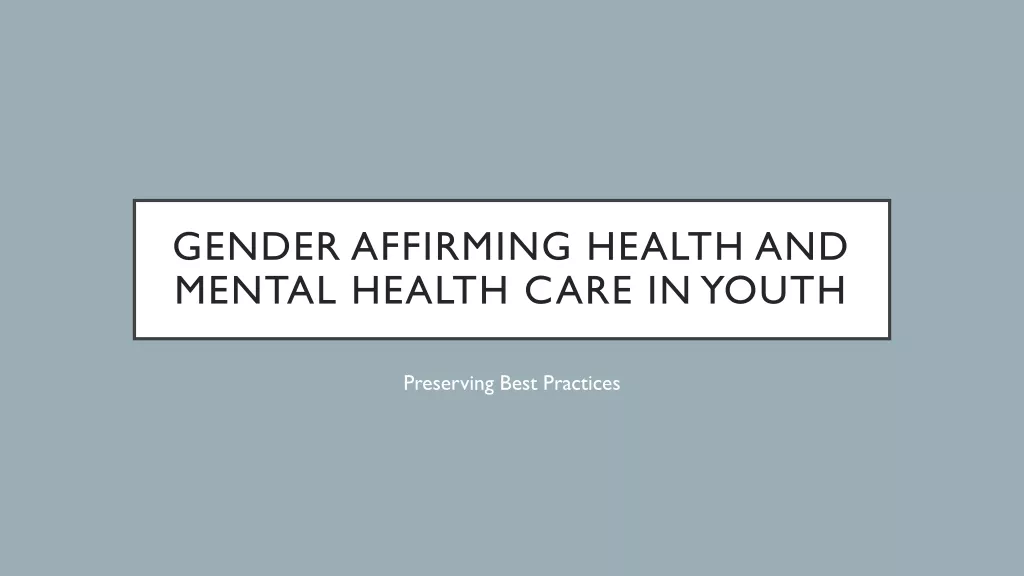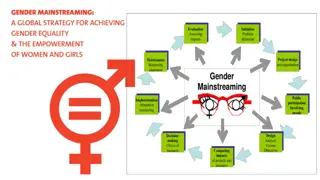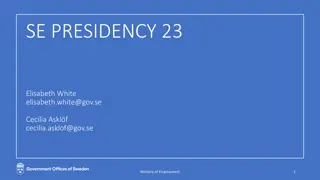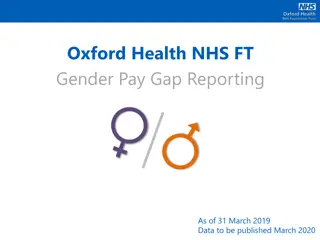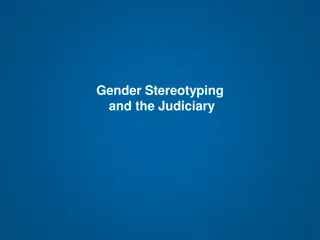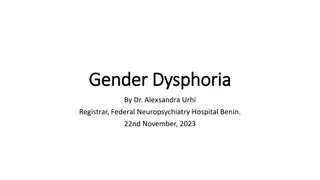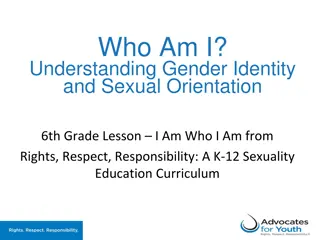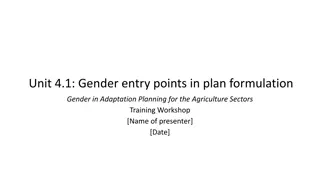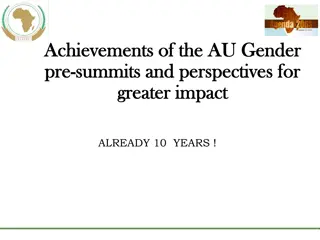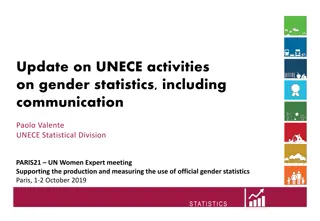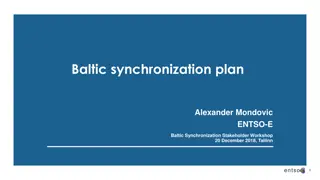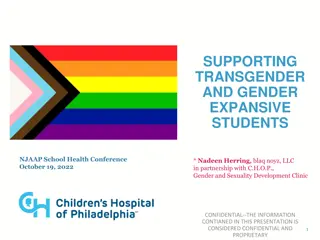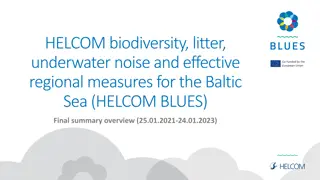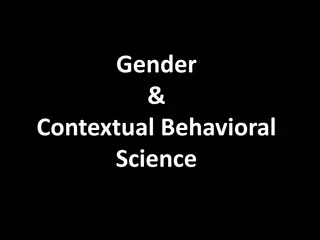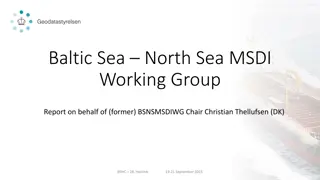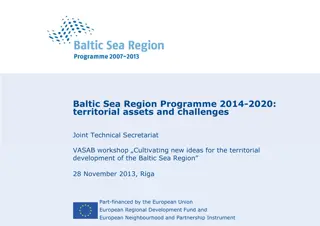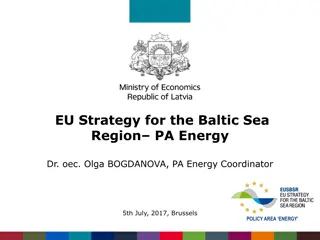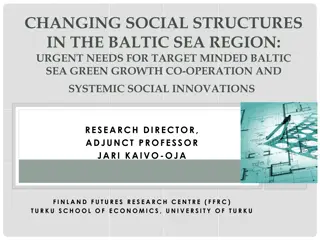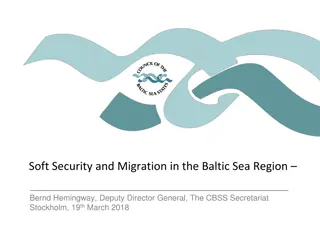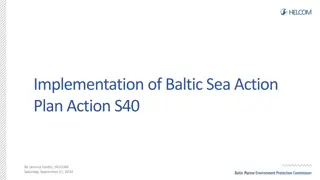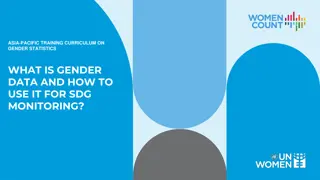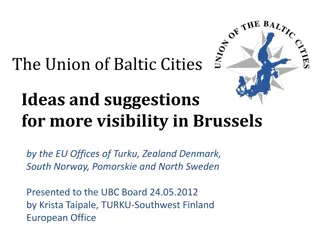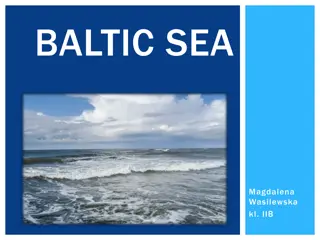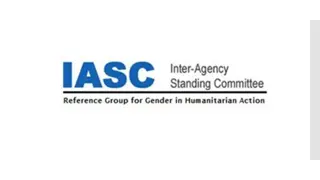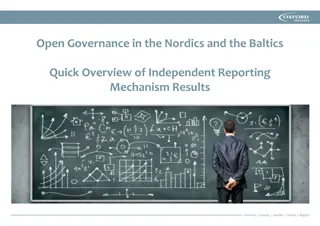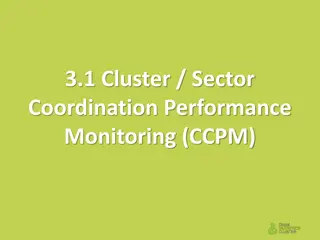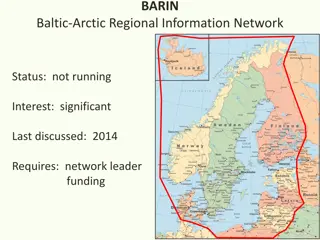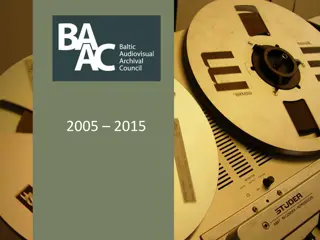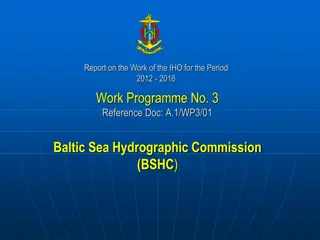GENDER STRATIFICATION
Gender stratification involves the social ranking where men typically occupy higher statuses than women, leading to gender inequality. Feminist theory extends feminism into theoretical discourse to analyze and critique gender roles, inequalities, and patriarchy. Conflict theory is used to examine th
7 views • 8 slides
Understanding Gender Roles in Society
Gender roles in society are socially constructed, with distinctions between gender and sex. Gender influences behavior, responsibilities, and societal expectations. Factors like family, caste, class, religion, culture, media, and laws play a significant role in shaping these roles. It's crucial to c
1 views • 34 slides
Gender Roles in Society: Understanding Sex and Gender
Explore the intricate relationship between sex and gender, uncovering the societal constructs that shape gender roles. Delve into the definitions of sex and gender, and analyze the factors contributing to gender inequalities. Gain insight into gender-just education beyond traditional school settings
0 views • 29 slides
Understanding Gender-Affirming Health and Mental Care in Youth
Gender-affirming health and mental care in youth focus on supporting individuals in transitioning to a gender aligning with their identity. It involves reducing gender dysphoria, following evidence-based practices, and respecting diverse gender expressions. Gender identity development is influenced
1 views • 21 slides
Rowing Committee Selection Criteria and Activities for 2024 Season
The Rowing Committee's selection criteria and activities for the 2024 season are outlined, focusing on the process for selecting teams for various representative tasks sanctioned by the Danish Rowing Association (DFfR). The criteria serve as a starting point, with the committee having the discretion
1 views • 21 slides
Gender Mainstreaming:
Gender mainstreaming in policy-making involves incorporating both women's and men's interests to promote gender equality. Good nutrition is essential to overcome gender barriers, with women and girls being disproportionately affected by malnutrition. Empowering women and girls through access to good
0 views • 12 slides
Gender-based Climate Change Litigation: A Key Solution?
Gender-based climate change litigation is emerging as a potential solution to address the disproportionate impact of climate change on different genders. Various international bodies have recognized the importance of integrating a gender-responsive approach in climate action to uphold human rights,
4 views • 12 slides
Gender Mainstreaming Activities in SE Presidency 2023
The content highlights various gender mainstreaming activities and events scheduled for SE Presidency 2023, focusing on gender equality in different sectors. It includes conferences, high-level meetings, and initiatives promoting gender mainstreaming measures. Government offices are implementing dec
0 views • 5 slides
Top 12 Tricks for Mainstreaming Gender in Publications
Tricks recommended for mainstreaming gender in publications include considering gender throughout the development process, integrating gender in each section, seeking women's perspectives in research, providing gender-disaggregated data, aiming for gender balance among reviewers, involving a gender
0 views • 5 slides
Analysis of Gender Pay Gap Reporting at Oxford Health NHS FT as of March 2019
The Gender Pay Gap report at Oxford Health NHS FT covers key aspects including mean and median gender pay gaps in hourly pay, bonus gaps, proportion of employees receiving bonuses, and proportion of males and females in each pay quartile. The report also highlights workforce gender distribution, Age
0 views • 17 slides
Gender-based Violence Against Women in the Judiciary
Gender-based violence against women refers to violence directed at women because of their gender, encompassing physical, mental, and sexual harm, coercion, and deprivation of liberty. The judiciary plays a crucial role in addressing wrongful gender stereotyping in gender-based violence cases to ensu
0 views • 16 slides
Understanding Gender Dysphoria: Diagnosis and Management
Gender dysphoria, previously known as gender identity disorder, refers to persistent discomfort with one's biologic sex or assigned gender. This article explores the epidemiology, diagnostic criteria, and management of gender dysphoria, highlighting prevalence rates and research findings from variou
1 views • 26 slides
Gender-Responsive Planning and Budgeting for Climate Change Resilience
Planning and budgeting processes from a gender perspective are crucial for achieving gender equality and addressing climate change effectively. Gender mainstreaming in planning involves considering the specific needs and capabilities of men and women in national programs. Budgeting with a gender per
1 views • 18 slides
Understanding Gender Identity and Sexual Orientation in 6th Grade
Explore the concepts of gender, body parts, chromosomes, and societal expectations in relation to gender identity and expression. Learn about the diversity of gender identities and the importance of respecting individual self-identifications. Understand the distinction between gender identity, gende
0 views • 12 slides
Gender and Our Mandate - International Gender Unit Event 2019
Explore the objectives of the International Gender Unit event focusing on gender equality, gender-based violence, and nutrition with activities like quizzes and polls. Understand the importance of working on gender equality, reflect on integration strategies, and learn how it helps fulfill the missi
4 views • 19 slides
Gender-Responsive Adaptation Planning in Agriculture Sectors
This workshop explores gender entry points in plan formulation for agriculture adaptation, emphasizing the importance of considering gender differences. It discusses key characteristics of gender-responsive plans, actions to ensure gender inclusion, and potential risks of neglecting gender perspecti
0 views • 12 slides
AU Gender Achievements Over 10 Years: Summits and Perspectives on Greater Impact
The AU Gender Achievements spans over a decade, with a focus on pre-summits and strategies for enhanced impact. Beginning with the establishment of the AU Gender Pre-Summit in 2009, subsequent milestones marked a new phase of inclusivity and involvement of key stakeholders such as AU Ministers of ge
0 views • 11 slides
Gender-Based Violence Prevention and Gender Equality in the Nordic Context
The discussion focuses on the prevention of violence against women in the Nordic countries, exploring the concepts of gender-based, gender-neutral, and gender-blind approaches. The Istanbul Convention is highlighted as linking violence to gender equality, emphasizing the importance of feminist persp
0 views • 17 slides
Update on UNECE Activities on Gender Statistics & Recent Initiatives
The UNECE Statistical Division, along with partners, has been actively involved in supporting the production and measurement of official gender statistics. Ongoing initiatives include projects on gender statistics in various countries, workshops on dissemination and communication, and the developmen
0 views • 8 slides
Baltic Synchronization Plan and Frequency Stability Study
The Baltic Synchronization Plan explores the outcomes of the Frequency Stability Study, focusing on the effects on synchronous areas and the ENTSO-E procedure. It delves into scenarios involving existing and new HVDC links between countries like Poland and Lithuania, emphasizing the importance of th
0 views • 19 slides
Understanding Policy Change in the Baltic Sea Region
Financial and fiscal bureaucracy in the Baltic Sea Region is examined, focusing on micro-level practices and routines within public sector organizations. Case studies from Estonia, Latvia, Sweden, Norway, Lithuania, and Southeast Asia are analyzed to understand the implementation of financial and fi
4 views • 7 slides
Understanding and Supporting Transgender & Gender Expansive Students
Explore the complexities of gender identity and expression through a presentation focusing on breaking down traditional gender norms, learning where gender rules are derived, and examining societal influences on how we perceive gender. The content delves into the intersection of biological sex, gend
0 views • 25 slides
Supporting Marine Environment in the Baltic Sea: HELCOM.BLUES Project Overview
The HELCOM.BLUES project focuses on biodiversity, litter, underwater noise, and regional measures for the Baltic Sea. It aims to enhance regional capacity for developing effective measures to maintain a healthy marine environment. The project involves a consortium of 14 partners and over 7 subcontra
0 views • 22 slides
Understanding Gender and Behavioral Science
Exploring the nuances of gender, this content delves into the variance among genders, the impact of gender on behavior, and societal issues related to gender discrimination. It challenges the binary view of gender and highlights the performative spectrum influenced by culture, language, biology, and
0 views • 18 slides
Baltic Sea North Sea MSDI Working Group Report
The Baltic Sea North Sea MSDI Working Group report presents the group's history, current dormant state, and plans for the future. Following low activity in recent years, discussions among members concluded that the group may no longer add value to international work on MSDI. The group is set to rema
0 views • 6 slides
Territorial Development in the Baltic Sea Region Programme 2014-2020
The Baltic Sea Region Programme 2014-2020 focuses on sustainable regional development through transnational cooperation projects, addressing territorial challenges, and fostering place-based growth. It covers 11 participating countries and aligns with the EU Strategy for the Baltic Sea Region, provi
1 views • 11 slides
EU Strategy for the Baltic Sea Region PA Energy Overview
The EU Strategy for the Baltic Sea Region focuses on enhancing regional energy cooperation and optimizing formats in Energy. Key elements include the BEMIP Joint Action Plan, promoting sustainable energy development, and enhancing energy efficiency. The Policy Area Energy reform aims to integrate th
0 views • 19 slides
Transforming Social and Economic Structures in the Baltic Sea Region
Urgent cooperation is needed for Baltic Sea green growth initiatives and innovative research to address changing social and economic structures. Key themes include green growth, global climate change, economic growth, and innovation platforms. The shift towards the sixth wave and green growth presen
0 views • 36 slides
Soft Security and Migration Management in the Baltic Sea Region
The conference in Helsinki addressed soft security and migration challenges in the Baltic Sea Region, emphasizing the integration of migrants and societal security paradigms. It highlighted the need for a consensual approach, dialogue, and promotion of social inclusion. The current migration system
0 views • 12 slides
Implementation of Baltic Sea Action Plan Action S40 Overview
The Baltic Sea Action Plan aims for a healthy Baltic Sea environment by implementing 199 actions and measures by 2030. Action S40 focuses on identifying fish species needing better data by 2024 and implementing measures for good environmental status. Programs are established to record and report dat
0 views • 12 slides
Understanding Gender Data for SDG Monitoring in Asia-Pacific Training Curriculum
This training curriculum delves into the nuances of gender data, distinguishing between sex and gender, and emphasizes the importance of gender statistics for monitoring Sustainable Development Goals (SDGs). It covers the significance of disaggregating data by sex to produce gender statistics, which
0 views • 20 slides
Enhancing Visibility of the Union of Baltic Cities in Brussels and Key Policy Focus Areas
Ideas and suggestions were presented to the UBC Board to increase visibility in Brussels by the EU offices of Turku, Zealand Denmark, South Norway, Pomorskie, and North Sweden. The focus includes positioning UBC as a relevant actor to the EU, branding through lobbying and clear communication, and su
0 views • 10 slides
Explore the Wonders of the Baltic Sea
The Baltic Sea, located in Northern Europe, is a unique body of water known for its brackish nature and rich biodiversity. Stretching across various regions and basins, the sea is home to numerous islands and archipelagos, each adding to its charm and beauty. Discover the geophysical data, coastal t
0 views • 11 slides
Understanding Gender: Exploring Gender Identity and Expression
Delve into the concept of gender through this educational presentation, covering topics such as gender classification, common gender types, and methods to change gender expression. Discover how words and compound nouns can shift from masculine to feminine forms, and explore examples of gender transf
0 views • 16 slides
Enhancing Gender Equality in Humanitarian Action
The Gender Reference Group (GRG) conducted a review in 2015 of the IASC's Gender Policy Statement, highlighting inconsistent implementation and lack of gender capacity. As the GRG Chair, UN Women will lead the revision of the 2008 Gender Policy to establish an accountability framework. This update a
0 views • 5 slides
Overview of Open Governance in the Nordic and Baltic Regions
Explore the status of Open Government Partnership processes in the Nordic and Baltic countries, including challenges, partnerships, and responsible entities. Gain insights from Independent Reporting Mechanism results and national progress reports. Learn about the latest assessments, consultation met
0 views • 16 slides
Cluster Sector Coordination Performance Monitoring (CCPM): Enhancing Gender Equality and GBV Protection
The CCPM framework allows for self-assessment of cluster performance in key areas like gender equality and protection against gender-based violence (GBV). It focuses on supporting service delivery with gender and inclusion considerations, strategic decision-making, gender-responsive strategy develop
0 views • 15 slides
BARIN Baltic-Arctic Regional Information Network Overview
BARIN, a network focused on environmental monitoring and climate change research in the Baltic-Arctic region, is currently not running but has a significant interest. Established connections with over 50 research institutes and universities. Key areas of interest include carbon flux monitoring, clim
0 views • 7 slides
History and Formation of Baltic Audiovisual Archival Council (BAAC)
The Baltic Audiovisual Archival Council (BAAC) is an independent non-profit organization established to foster cooperation among archives, broadcasting, TV archives, libraries, and museums holding audiovisual materials related to the Baltic States, Scandinavian countries, and the Baltic diaspora. Th
0 views • 13 slides
Report on the Work of the IHO for the Period 2012-2016 by the Baltic Sea Hydrographic Commission (BSHC)
The report highlights the achievements of the Baltic Sea Hydrographic Commission (BSHC) during 2012-2016, including joint projects, database provisions, harmonized chart datum, and collaboration efforts. It also addresses the challenges faced by Lithuania as an Associate Member and emphasizes the pr
0 views • 6 slides
